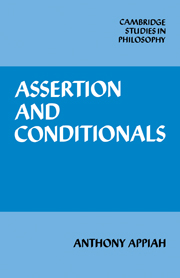4 - Computation
Published online by Cambridge University Press: 07 October 2011
Summary
1. The only psychological models of cognitive processes that seem even remotely plausible represent such processes as computational.
2. Computation presupposes a medium of computation: a representational system.
3. Remotely plausible theories are better than no theories at all.
(Fodor, 1976: 27)OVERVIEW
Because our theory is computational it will treat beliefs as representations; and it says that some mental processes are computations with these and other representations. Every representation which is a belief has also a property which reflects the degree of that belief; and every desire is a representation with a property that reflects its strength; i.e. in the technical sense introduced in Chapter 3, the subjective ‘desirability’ of what is thereby desired. Together these determine utilities, which determine action. What is required by a computational theory of decision is that our minds are so constituted that, given these materials, they compute the expected utilities that underlie our actions. This computation is a mental process, a process which is carried out in us by our central nervous systems, and which, like all processes, takes time. But it is a process which can also go wrong, a process in which computational errors can occur. If the computations are completed, then we come to be in a state of preferring some options to others and this causes us to do one of those most preferred basic actions; and if the computation is without error as well as complete, then that action will be a basic action with maximum expected utility.
- Type
- Chapter
- Information
- Assertion and Conditionals , pp. 73 - 99Publisher: Cambridge University PressPrint publication year: 1985



